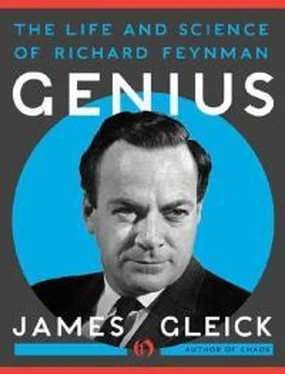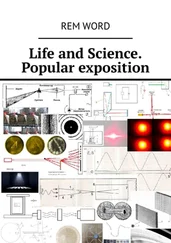Now a fourth question— Do you think people talk about you? —and Feynman detects that this is the routine: three innocent questions and then down to business.
“So I say, Yeah …” At this point Feynman, relating the story, takes on a tone of misunderstood innocence. He is scrupulously honest. If only the psychiatrist would forget the formulas, forget the mumbo jumbo, and try to understand
him. “I wasn’t trying to fake it… . I meant in the sense that my mother talks to her friends… . I tried to explain—
honest… .” The psychiatrist makes a note.
Do you think people stare at you? Feynman would say no—honest—but the psychiatrist adds, For example, do you think that any of the fellows sitting on the benches are looking at us now. Wel , Feynman has sat on one of those benches, and there was not much else to look at. He does some mental arithmetic. “So I figure … there are about twelve guys in the thing and about three of them are looking
—wel , that’s al they’ve got to do—so I say, to be conservative, ‘Yeah, maybe two of them are looking at us.’”
He turns around to check, and sure enough. But the psychiatrist, “this nincompoop, this nincompoop … doesn’t bother to turn around and find out if it’s true or not.” (No scientist he.)
Do you talk to yourself? “I admitted that I do… .”
(“Incidental y, I didn’t tel him something which I can tel you, which is I find myself sometimes talking to myself in quite an elaborate fashion … : ‘The integral wil be larger than this sum of the terms, so that would make the pressure higher, you see?’ ‘No, you’re crazy.’ ‘No, I’m not! No, I’m not!’ I say. I argue with myself… I have two voices that work back and forth.”)
I see you lost a wife recently. Do you talk to her? (The resentment that this question must stir goes beyond the comic bounds of the anecdote.)
Do you hear voices in your head? “No,” Feynman says.
“Very rarely.” He admits a few occasions. Sometimes, in fact, just as he was fal ing asleep, he would hear Edward Tel er, with a distinctive Hungarian accent, in Chicago giving him his first briefing on the atomic bomb.
There was much more: an argument about the nature of insanity, an argument about the value of life—Feynman in both cases continuing to get under the examiner’s skin.
Feynman acknowledged that one of his mother’s sisters was mental y il . And then the punch line, more serious than Feynman’s audiences tended to realize.
Well, Dick, I see you have a Ph.D. Where did you study?
MIT and Princeton. Where did you study?
Yale and London. And what did you study, Dick?
Physics. And what did you study?
Medicine.
And this is medicine?
The story never included several plausible points.
Feynman never pleaded that, having contributed three years of wartime service in the Manhattan Project, he ought to be exempt from a further contribution. Nor did he mention how destructive it would have been to his career as a theoretical physicist if he had been conscripted now, at the age of twenty-eight. He had to walk a narrow line. There was nothing amusing or stylish in the summer of 1946
about evading the draft. For most people, to be declared mental y deficient by one’s draft board was a more frightening possibility than army service—far more
damaging to one’s civilian prospects. So the Selective Service established few safeguards against fakery in the psychiatric examination. It did not expect to see records of a previous history of mental il ness, for example; in any case private psychiatric treatment was far more unusual than it became in the next generation. Examiners felt they could rely on a subject’s naïve self-description to answer their checklist questions. Feynman repeated his answers to a second psychiatrist. His ability to conjure the voice of Tel er was recorded as hypnagogic hallucinations . It was noted that the subject had a peculiar stare . (“I think it was probably when I said, ‘And this is medicine?’”) He was rejected.
It occurred to him that the Selective Service would examine its own files and discover a series of official letters requesting deferment so that Feynman could conduct essential research in physics during the war. More recent letters stated that he was performing an important service educating future physicists at Cornel . Might someone conclude that he was deliberately trying to deceive the examiners? To protect himself, he wrote a letter, careful y phrased, stating for the record that he believed no weight should be given to the finding of psychiatric deficiency. The Selective Service replied with a new draft card: 4-F.
Around a Mental Block
Princeton was celebrating the bicentennial of its founding
with a grand explosion of pomp that fal : parties, processions, and a series of formal conferences that drew scholars and dignitaries from long distances. Dirac had agreed to speak on elementary particles as part of a three-day session on the future of nuclear science. Feynman was invited to introduce his one-time hero and lead a discussion afterward.
He disliked Dirac’s paper, a restatement of the now-familiar difficulties with quantum electrodynamics. It struck him as backward-looking in its Hamiltonian energy-centered emphasis—a dead end. He made so many nervous jokes that Niels Bohr, who was due to speak later in the day, stood up and criticized him for his lack of seriousness. Feynman made a heartfelt remark about the unsettled state of the theory. “We need an intuitive leap at the mathematical formalism, such as we had in the Dirac electron theory,” he said. “We need a stroke of genius.”
As the day wore on—Robert Wilson speaking about the high-energy scattering of protons, E. O. Lawrence lecturing on his California accelerators—Feynman looked out the window and saw Dirac lol ing on a patch of grass and gazing at the sky. He had a question that he had wanted to ask Dirac since before the war. He wandered out and sat down. A remark in a 1933 paper of Dirac’s had given Feynman a crucial clue toward his discovery of a quantum-mechanical version of the action in classical mechanics. “It is now easy to see what the quantum analogue of al this must be,” Dirac had written, but neither he nor anyone else had pursued this clue until Feynman discovered that the
“analogue” was, in fact, exactly proportional. There was a rigorous and potential y useful mathematical bond. Now he asked Dirac whether the great man had known al along that the two quantities were proportional.
“Are they?” Dirac said. Feynman said yes, they were.
After a silence he walked away.
Feynman’s reputation was traveling around the university circuit. Job offers floated his way. They seemed perversely inappropriate and did nothing to help his mood of frustration. Oppenheimer had invited him to California for the spring semester; now he turned the invitation down.
Cornel promoted him to associate professor and raised his salary again. The chairman of the University of Pennsylvania’s physics department needed a new chief theorist. Here Bethe stepped in paternalistical y: he had no intention of letting go of Feynman, and he was sensitive to his protégé’s mood. He thought it would be harmful for this suddenly unproductive twenty-eight-year-old to take on the psychological responsibility of a lead role in a university theory group. More than anything, he thought Feynman needed shelter. (He told the Pennsylvania administrator that Feynman was the second-best young physicist around: second to Schwinger.) For Feynman the most surprising—
Читать дальше












